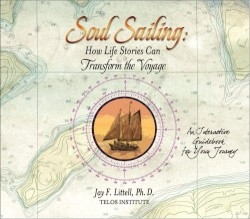Soul Sailing
How Life-Stories Can Transorm the Voyage
When we combine our Authentic Self with faith in the power of change, we began to climb out of various holes…
Soul Sailing is a broad-fronted appeal to a loose-but-gathering coalition of the traditionally religious and practitioners of New Age spiritualism. The telling of one’s personal stories is identified as a key opportunity for growth and improved function. Barriers to understanding the self and the needs of others are the tendency toward us-versus-them dualism and limiting or faulty prisms of reference called Looking Glasses. The graphic design utilizes a system of nautical references and symbols, generous white space and regular infusions of appropriate outside wisdom. Recurring features are led by focused question-answering exercises.
Psychologists and self-help household names relied on to reinforce points are positivity mainstreamers like Scott Peck, Gary Zhukov and Marianne Williamson. An eclectic array of quotable thinkers on the human condition include: Seven Habits author Stephen Covey, myth theorist Joseph Campbell, Christian-Buddhist harmonizer Thich Nhat Hanh and Joan Baez, who said, “Action is the antidote to despair.” Some terminology is inspired by AA-form recovery disciplines.
A tool of great utility is the annotated bibliography, which provides elucidating coverage of related and underlying sources. The deftly composed final chapter proposes progressive action for unsatisfied folks to improve the wider world, reduce anxiety and better align work-lives with spiritual values. An exercise called “Logging Your Job Change Story” helps quickly identify what’s gone wrong in previous employment situations in order to prevent the torpedoing of current or future positions. Littell optimistically suggests that ethics can and will have a place in business—a “conscious capitalism” which considers Fair Trade and a living wage imperative.
Though eastern faiths are liberally incorporated, the primacy of Bible-based religion is still particularized. “New Jerusalem” is the preferred term here for a social space of the community-centered who’ve grown beyond superficial divisions. Certain exercises encourage sensory visualization of emotionally upsetting moments. One pinpoints bodily reactions to a memory of being intimidated. Readers aren’t stuck in bad places without escape instructions, but some could respond rather viscerally in the absence of an on-site mental health professional to modulate matters.
Jay Littell is a Ph.D. in Comparative Government, a Harvard Ed.M., and a certified massage therapist. He is now the driving force behind the Telos Institute, presenting SupperWhere(TM) seminars in conjunction with the principles and activities detailed in this book. Soul Sailing underlines commonalities and breaks down territorial defensiveness between faiths and mindsets. The result is imperfect, but the text glimmers with sanity, balance and openness. It’s likely to be helpful to seekers who feel shortchanged by the narrowness of any single party line.
Disclosure: This article is not an endorsement, but a review. The publisher of this book provided free copies of the book and paid a small fee to have their book reviewed by a professional reviewer. Foreword Reviews and Clarion Reviews make no guarantee that the publisher will receive a positive review. Foreword Magazine, Inc. is disclosing this in accordance with the Federal Trade Commission’s 16 CFR, Part 255.

